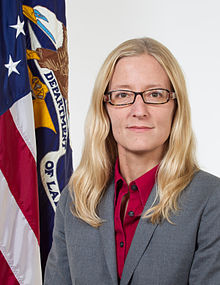 | |
| Formation | 1986 |
|---|---|
| Founder | Jeff Faux, Lester Thurow, Ray Marshall, Barry Bluestone, Robert Reich, Robert Kuttner |
| Type | Public policy think tank |
| 52-1368964 | |
| Location |
|
| Coordinates | 38°54′06″N 77°01′45″W / 38.901627°N 77.029256°W |
President | Heidi Shierholz |
| Revenue | $8,020,337[1] (2018) |
| Expenses | $6,699,574[1] (2018) |
| Website | www |
The Economic Policy Institute (EPI) is a 501(c)(3) non-profit American think tank based in Washington, D.C., that carries out economic research and analyzes the economic impact of policies and proposals. Affiliated with the labor movement,[2][3][4] the EPI is usually described as presenting a left-leaning and pro-union viewpoint on public policy issues.[5][6] Since 2021, EPI has been led by economist Heidi Shierholz, the former chief economist of the Department of Labor.
EPI has an advocacy arm, EPI Action, which is a 501(c)(4) group.
History
[edit]EPI was founded in 1986 by economists Jeff Faux, Lester Thurow, Ray Marshall, Barry Bluestone, Robert Reich, and Robert Kuttner.[7] Since 2021, Heidi Shierholz has served as its president.[8] Shierholz succeeded Thea Lee, who was named Deputy Undersecretary for International Affairs at the Department of Labor by President Joe Biden.[9]
Policy proposals
[edit]EPI supported Bernie Sanders's Medicare for All proposal. In a March 2020 policy paper, it argued that the loss of jobs in the insurance industry and in administering the current system would be small, within the normal job churn, and easily absorbed by the economy. The paper argued that this cost would be outweighed by the benefits of universal health care and in small business formation.[10][11] EPI has also released policy papers analyzing U.S. investment in early childhood education.[12]
In July 2012, EPI and the AFL–CIO, Center for Community Change, Leadership Conference on Civil and Human Rights, National Council of La Raza and SEIU proposed a budget plan titled Prosperity Economics, a counter to the Republican Party's Path to Prosperity budget plan. The Prosperity Economics plan suggests that major public investment in areas like infrastructure is needed to jump-start the economy.[13]

In response to the debate over the United States fiscal cliff, EPI economist Josh Bivens advocated raising tax rates for higher income earners, writing: "Given this rise in [income] inequality, it makes sense that much of the future burden of reducing budget deficits should be borne by those who have benefited the most from economic trends in recent decades."[14]
Funding
[edit]Eight labor unions made a five-year funding pledge to EPI at its inception: AFSCME, United Auto Workers, United Steelworkers, United Mine Workers, International Association of Machinists, Communications Workers of America, Service Employees International Union, and United Food and Commercial Workers Union.[15] According to EPI, about 29% of its funding between 2005 and 2009 was supplied by labor unions and about 53% came from foundation grants.[7]
In the 1980s, EPI took money from the Tobacco Institute, a now-defunct tobacco industry trade group, to oppose excise taxes on the tobacco industry's behalf. The Tobacco Institute worked with groups like EPI "to support the release of studies, editorials, press briefings, and testimony against regressive excise taxes" that would negatively impact the tobacco industry's bottom line if passed.[16]
References
[edit]- ^ a b "Economic Policy Institute" (PDF). Foundation Center. Retrieved 10 Feb 2022.
- ^ Eckes, Alfred E. (2009). U.S. Trade Issues: A Reference Handbook. Greenwood Publishing Group. ISBN 9781598841992.
- ^ Sauvant, Karl P. (January 2009). Investing in the United States: Is the US Ready for FDI from China?. Edward Elgar Publishing. p. 90. ISBN 9781849803502.
- ^ Sinclair, Barbara (22 October 2014). Party Wars: Polarization and the Politics of National Policy Making. University of Oklahoma Press. p. 331. ISBN 9780806182162.
- ^
- Jonathan Lemire, Kevin Freking and Aamer Madhani (2020-04-15). "New Trump advisory groups to consult on reopening US economy". Associated Press.
'It doesn't work if you bring in the hallelujah chorus,' said Thea Lee, president of the Economic Policy Institute, a left-leaning Washington think tank.
- Wiessner, Daniel (2019-12-19). "IN BRIEF: Report says 1.5 mln grad students would lose union rights under NLRB rule". Reuters.
The left-leaning Economic Policy Institute in the report also said that 57,500 graduate students who are already unionized would lose the ability to collectively bargain with their schools under the September proposal.
- Lyons, Patrick J. (2020-03-17). "Coronavirus Briefing: What Happened Today". The New York Times.
The left-leaning Economic Policy Institute projects up to three million jobs lost by summer.
- McGregor, Jena (2017-07-20). "Major company CEOs made 271 times the typical U.S. worker in 2016". The Washington Post.
The report from the left-leaning think tank said that number was slightly lower than 2015, when average pay was $16.3 million and the ratio was 286-to-1.
- Masunaga, Samantha (2015-06-22). "CEO pay is 303 times that of workers, study finds". Los Angeles Times.
Chief executives of the country's largest firms made 303 times more than a "typical" worker in 2014, according to a report from the Economic Policy Institute, a left-leaning think tank.
- Jonathan Lemire, Kevin Freking and Aamer Madhani (2020-04-15). "New Trump advisory groups to consult on reopening US economy". Associated Press.
- ^
- Hiltzik, Michael (2012-10-02). "Unmasking the most influential billionaire in U.S. politics". Los Angeles Times.
The foundation's roster of grant recipients has been similarly eclectic: the right-wing Heritage Foundation and the liberal Brookings Institution. The progressive Center for American Progress, the free-market American Enterprise Institute and the pro-union Economic Policy Institute.
- Bruce Miroff, Raymond Seidelman, Todd Swanstrom, Tom De Luca (2009). The Democratic Debate: American Politics in an Age of Change. Cengage Learning. p. 221. ISBN 9780547216386.
Economic Policy Institute ... Pro-union; favors more equal distribution of wealth
{{cite book}}: CS1 maint: multiple names: authors list (link)
- Hiltzik, Michael (2012-10-02). "Unmasking the most influential billionaire in U.S. politics". Los Angeles Times.
- ^ a b "About". Economic Policy Institute. Retrieved 27 November 2012.
- ^ "Staff". Economic Policy Institute. Retrieved 2020-02-12.
- ^ Hsu, Andrea (2021-05-10). "Longtime AFL-CIO Official Takes Up Key Labor Post In Biden Administration". NPR. Retrieved 2022-02-04.
- ^ Ingraham, Christopher (2020-03-05). "Analysis | Medicare-for-all would be a boon to the American labor market, study finds". Washington Post. ISSN 0190-8286. Retrieved 2023-08-07.
- ^ Derysh, Igor (2020-03-14). "Medicare for All would lead to job boom, experts say". Salon. Retrieved 2023-04-26.
- ^ Grose, Jessica (2022-02-02). "Opinion | How to Fix Child Care Before the Next Pandemic Wave". The New York Times. ISSN 0362-4331. Retrieved 2022-02-04.
- ^ Izadi, Elahe (2012-07-31). "Liberal Groups Counter GOP's Economic Agenda With New Plan". National Journal. Archived from the original on 16 November 2012. Retrieved 28 November 2012.
- ^ Milani, Kate (2012-11-20). "Economists React: The Fiscal Cliff 'Can't Be Fully Avoided'". Wall Street Journal. Retrieved 28 November 2012.
- ^ Taylor, Paul (19 February 1987). "Analyzing Alternatives In Labor's Think Tank;Liberal Economists Study Government's Role". The Washington Post. Archived from the original on January 31, 2013. Retrieved 23 July 2012.
- ^ Balbach, Edith D.; Campbell, Richard B. (Aug 2009). "Union Women, the Tobacco Industry, and Excise Taxes". American Journal of Preventive Medicine. 37 (2): S121-5. doi:10.1016/j.amepre.2009.05.011. PMC 2712937. PMID 19591750.
External links
[edit]- Official website

- "Economic Policy Institute Internal Revenue Service filings". ProPublica Nonprofit Explorer.